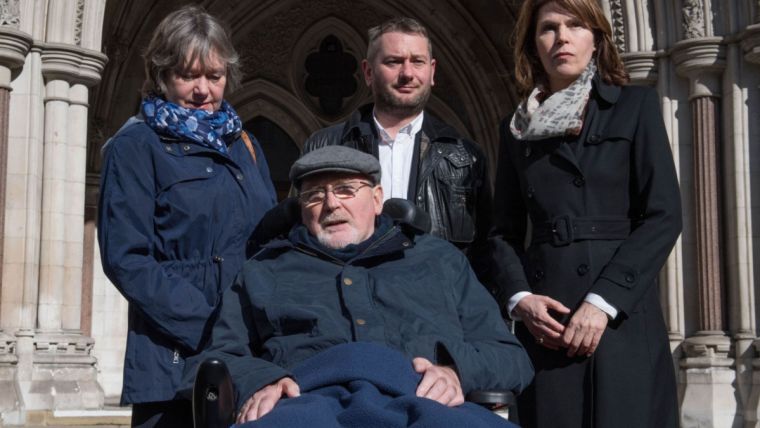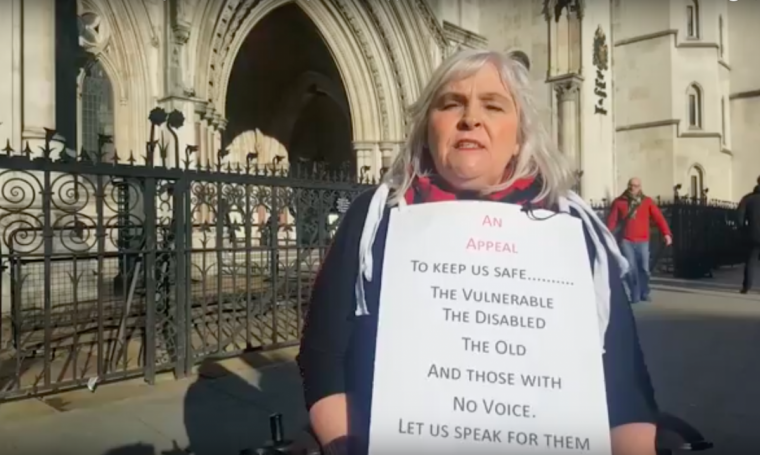Christian campaigners protest as assisted dying law is tested in court again

Noel Conway, who has motor neurone disease and is not expected to live longer than another nine months, is to challenge the law against assisted dying in London today.
Conway, 67, a retired college lecturer, wants to be allowed to choose to end his life with assistance when he is in his last six months.
He is seeking a declaration that the Suicide Act 1961 is incompatible with European laws on respect for private and family life, and protection from discrimination.
The Suicide Act decriminalised prosecution of those who try and fail to kill themselves but also created a new offence of 'complicity in suicide', meaning that anyone who assists a suicide or suicide attempt faces up to 14 years in jail.
The week-long hearing will be marked by protests from Christian campaigners who believe that to allow assisted suicide would 'undermine the dignity of human life and put vulnerable lives at risk'.
The last challenge to the law against assisted dying was in 2015 when the Labour MP Rob Marris MP introduced his Assisted Dying Bill, based on Lord Falconer's Bill of 2014. Marris's Bill was defeated at its second reading after four hours of debate by 330 MPs to 118.
Pro-life campaigners Nikki and Merv Kenward, of the Distant Voices group, which campaigns against euthanasia and assisted dying, will demonstrate their opposition to Conway with a giant puppet display outside the High Court, including an enormous judge holding a syringe.
Nikki Kenward was left paralysed in 1990, at the age of 37, by Guillain-Barre Syndrome, and for several months was only able to wink her right eye. Now, she remains wheelchair-bound and cannot hold a needle or tie her shoe-laces.
She says that if she had had the choice to die during her five months in hospital, she would have chosen death.
But she says that 'her spirit fought to live' and now campaigns against any liberalisation of the law.
She fears that if euthanasia becomes an option in our society, it will further degrade our attitude towards the dignity of life, leaving many vulnerable to being euthanised against their will – including children and those with mental health conditions.
The Kenwards, who earlier this year themselves lost a legal challenge to changes on guidelines regarding prosecuting healthcare professionals in connection with assisted suicide, are being supported by the Christian Legal Centre.
Conway, who being supported in his legal bid by Dignity in Dying, said: 'I have brought this case to fight for choice and control at the end of life – for me and for all terminally ill people and their loved ones who are being failed by the current law. I know I am going to die anyway, but how and when should be up to me. To have the option of an assisted death in this country would provide me with great reassurance and comfort. It would allow me to decide when I am ready to go, rather than be forced into a premature death by travelling abroad or be left at the mercy of a cruel illness.'
His bid to be allowed assistance to end his life was rejected by the High Court earlier this year but he was given leave to appeal, and that is the case being heard this week.

Tom Davies, from Dignity in Dying, told Sky News: 'Other countries just like us are managing to take hold of this issue and create more compassionate, safer laws that we could have in this country too.' He named Canada as an example, along with California and Colorado in the United States.
Andrea Williams, chief executive of the Christian Legal Centre, said: 'This is a very important case as it once again throws into possibility the introduction of assisted suicide in this nation.
'We have seen from other countries where assisted suicide and euthanasia have been legalised, that this has loosened vital protections for the most vulnerable in society. In these countries, people are being euthanised even for mental health conditions such as depression.
'This must serve as a warning to our nation to firmly resist these ongoing attempts to liberalise the law.
'We are delighted to support the Kenwards as they continue seeking to uphold the dignity and value of all human life.'
Roger Symes from Not Dead Yet also said he opposes Conway's challenge because he believes it puts vulnerable people at risk.
'What we've seen in other countries that legalise assisted suicide is that it starts off as only being available to a very small group and then it widens and widens. 'So anybody else who thinks: "This is nothing to do with me, this is just about one poor man who needs help to die," it's not that at all. It's actually about how we treat people in society who need help for whatever reason.'
A similar court case in 2014 involved Tony Nicklinson, paralysed after a stroke. The Supreme Court decided against Nicklinson's widow and said UK law on assisted dying was not contrary to the European Convention on Human Rights.
WATCH a debate on Sky News between the Editor of Christian Today and humanist Richy Thompson.











